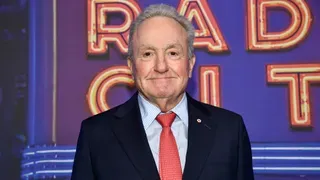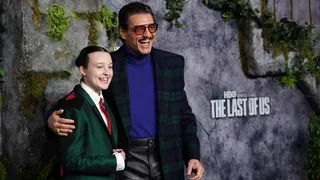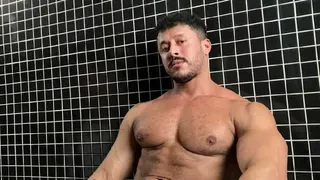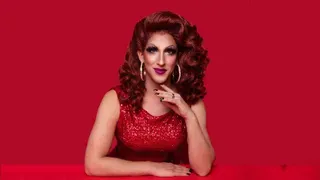September 1, 2017
Trans Actor Cody Sloan on SpeakEasy's 'Men on Boats'
Kilian Melloy READ TIME: 11 MIN.
When playwright Jaclyn Backhaus wrote instructions on casting her opus "Men on Boats" that specified queer, trans, ethnically diverse, and gender-nonconforming actors, she was ahead of the curve for our so-called modern day... and even more so given that the play is set in 1869 and the men in the play comprise an expedition to explore the Colorado River and the lands through which it wends.
As EDGE discovered when talking to one of the play's stars, Cody Sloan, this production is also a journey of discovery of sorts for the young man, who is newly out as a trans actor.
Cody Sloan chatted about the play's challenges to white, cis-male-made history, standing strong against resurgent bigotry, and the inherent personal vulnerability that's part and parcel of the theatrical arts.
EDGE: How did you come to be cast in this production of 'Men on Boats?'
Cody Sloan: I've been living in Boston for a couple of years and have been working professionally in the city for a year and a half, so I knew about SpeakEasy as a company and had seen some of their shows and known other actors who had worked with them. I really wanted to work with them -- I love the shows of theirs that I have seen.
I went to their Equity principle audition that they held for their whole season and I knew about this show in particular, and had read the script before going in, and went in specifically with this show in mind. I did the first audition for that, and then I was contacted to do a callback, which was kind of like a -- a very physical callback. Dawn Simmons, our director wanted to see us put together a physical scene for her, imagining we were on a boat. And I sent in a video for that, and that was basically it -- then she offered me a role.
EDGE: I love how this play is written specifically to be cast across ethnic, gender, and gender identity lines. How does the play's approach to gender and gender identity resonate with you?
Cody Sloan: Ever since the audition call went out -- in the script it says that all of the characters in the show in real life were, obviously, white cis-gender men, but the playwright specifically didn't want the actors to hold those identities. So even in the audition it said specifically, "We are looking for actors who are not white, cis-gender men." That was so exciting to see -- I had never seen a call like that, ever!
I love the fact that these men in real life were white, cis men but the play specifically calls for actors with very different identities and makes the actor's own bodies and identities an essential part of the world of the play. I think it's so amazing that we are able to, as an ensemble, tell this history in a different way, as people who may have been left out of that narrative in a lot of ways.
EDGE: How does this casting relate to the play's story and theme?
Cody Sloan: I think it allows us to say really interesting things about how history is told, who has the power to tell certain stories and tell them the way that they want, and what people are left out of that narrative, whose experiences are not held up and valued, and whose are. That, for me, is something that's super exciting about this show. It's wonderful to be able to feel like my identity as a trans person is really important in the process, and is really vital to the work that we're doing.
EDGE: I'm going to quote from playwright Jaclyn Backhaus's instructions here -- she says that she wants the play's cast to be 'racially diverse... trans-identifying, genderfluid, and /or non-gender-conforming.' That's a fascinating thing to want for a play that's set in 1869.
Cody Sloan: Right. It is really amazing, and I think what's so cool about what she's trying to do in the show. In some ways, I think she's really gettng us to look at [how] we think history is this one true thing, and we think it is completely unbiased. It's not! People with power are able to shape it in certain ways, and construct themselves in certain ways, and tell specific stories. In doing so, they leave out many peoples' experiences. I see that in the way that she brings Native American folks into the show. So I think the casting mirrors that, where you have a bunch of actors on stage who may be trans-identifying, who may not be white, who may be genderqueer -identifying sort inhabiting these roles and telling this story. I think it brings to light the fact that we were left out of certain stories in a lot of ways. To get to take on these characters and tell that story is really wonderful. I think the way the show is cast really helps push the audience to consider these questions. I think it's incredible, what Jaclyn has done and what she has done with the show, in what she wants the cast to look like.
EDGE: I wonder about this particular story, about an exploratory expedition, as opposed to other historical settings -- the Revolutionary War, the Civil War. Trans and gender-nonconforming individuals are presumably part of every historical moment. What about this particular story, do you suppose, draws the attention of the playwright?
Cody Sloan: For me, at least, what is interesting about picking this is I think the expedition of it and this idea that these cis white men were specifically chosen by the government to go into land and map it, and claim it, and take it for themselves, and name different landmarks, and map it for the government in a sanctioned way -- and there were already people living on that land. It was land that the native folks had probably already named. It's interesting. There is something happening that's about this expedition in particular where people are given power to go into these spaces and take them for themselves, and sort of make up their own stories about them -- and in doing so, very much ignore [the preexisting meanings] of these places and do harm to other people. I wonder if that's something that drew her to this story in particular.
EDGE: In this country's history it's not just a male's privilege to go and do those things you're talking about, but a matter of white, straight, cis male privilege.
Cody Sloan: Yes. I think that is something I have been noticing a lot as we've been rehearsing and having different conversations. Specifically, there's a scene between three of the men from the expedition and two native folks and I think it's one of the most important scenes in the play because you really see that -- these men are coming in on these expeditions, thinking they have the right and the authority to name these lands and take them for themselves, and the native folks have been there the whole time. So, I think these men's privilege is at the heart of the play.
EDGE: You play Frank Goodman. Tell me a bit about your character and your process in getting to know him, so to speak.
Cody Sloan: Frank is a British man. There are differences between him as a real person and him in the play; in the play I think he very much is little bit of an outsider to the expedition in some ways, not only as a British person but also a person coming to the expedition for adventure and, in some ways, looking for a vacation. He is not very invested in the mapping, and the [aspects of the journey] that are about the U.S. government. He eventually, after going overboard -- twice -- on the river decides to leave the expedition, and he goes to Utah and lives there for the rest of his life.
I really loved playing him and the process of figuring him out because he does go on this interesting journey of being interested and optimistic in the beginning, and then coming to this hard decision about does he stay, does he put his life in danger for this expedition that he does not feel super tied to. I did research about his as a real person. They don't now a lot about him his early life in particular, but he's different, as Jaclyn thinks of him; he's less skilled in the play than he may have been in real life.
For me it's been interesting to see the ways in which he is out of his depth, a little bit, on this expedition and also sort of an outcast amongst the men on the expedition. That's been interesting to explore.
EDGE: Roles like this are not so commonplace, in large place since plays like this are not so common. What are the challenges -- and the rewards -- of pursuing a career in acting as a trans person?
Cody Sloan: Oh, that's a great question... I would say that one of the wonderful things about acting is that it's a very vulnerable thing, but I feel that being a trans person on top of that in some ways makes it an even more vulnerable thing. Often there are ways in which you are being judged when you are an actor. Your own identity and your own [personal] presentation are sort of bound up in that. I think the challenge, at least for me, has been how much can I be open as a trans person when I go out for different projects and when I am working, versus how much I feel I have to keep that identity to myself. I'm at a place now where I feel I can be a working actor and also be out as a trans person. I've made that decision for myself. But that has been a scary thing, because I first and foremost want to be known as a good artist and a good actor and a good collaborator. It feels scary to think that people might judge my work and judge me ability based on my trans identity. I think that is a challenge.
The biggest rewards about being a trans actor are mostly that I hope, when people see my work, they see that trans actors do exist and our voices and experiences are really important and valuable in theater and in the world. If I can even be a small part of bringing trans folks more representation and opportunity in this industry, that would be amazing.
EDGE: When you say that acting is a 'vulnerable' thing to be an actor up on stage, are you also saying that the risks you take as an artist will lead to rewards for the audience?
Cody Sloan: Definitely. I think that's why people like to go see theater. That's why I love to go see theater. When the artists take risks and they're open and vulnerable, and they're present, and they are able to live in a more vulnerable way than sometimes we allow ourselves to be in real life -- I think that's why people go to the theater. But it's also a scary thing when I'm up on stage to know that many of the people in the audience know that I'm a trans person. That's a big step that I've taken in my career, and that was not true even a year ago, that not many people would know in the Boston community... but to do this show I have to sort of come out. It's a really significant thing, and an exciting and wonderful thing.
EDGE: I understand that in addition to acting, you are also an activist. Could you say a little about that?
Cody Sloan: I am. I do a lot of anti-domestic violence and anti-sexual violence work. And especially now, I try to get in involved in all the actions that are happening here [like] the recent of the rally that came to Boston.
EDGE: The counter-protests against the white supremacist rally? Were you there for that?
Cody Sloan: I was there before I had to go to rehearsal. I was there for as long as I could be there, and then walked right from the march to rehearsal.
(Laughter)
It was a really funny moment. But I think they are the same for me -- the work that I do as an activist and the work that I do as an actor. They are one and the same.
EDGE: Given that you were saying it was just a year ago you wouldn't have been comfortable being on stage as an out trans actor, it sounds like those parts of your life are twining together now.
Cody Sloan: They are. That is such a wonderful thing, to go from feeling, in the rehearsal room or the audition room, that I had chosen to keep that to myself for fear of the judgments people would have, to go into this audition and into this rehearsal process with [that aspect of myself] being super important and super vital to the story we're telling. That has been so exciting, and people have only responded in positive ways, and I have been very, very lucky.
EDGE: Over the past few years the trans community has become much more visible, and has shared in some of the gains that the LGBT community as a whole has made -- though of course, now we all face the erosion or the possible sudden curtailing of those gains, and the social and political climate has become much more hostile toward us, especially toward trans people. Are you feeling less safe than before? Or more energized? Or both?
Cody Sloan: I recognize that even though I am a trans person, I am also a super-privileged trans person. I have been very lucky to have the money and access to transition in a way that I can live in the world and people won't know I'm trans unless I tell them. I'm also very fortunate to be read as a white man -- I can pass in a normative way. I don't feel any less safe because of the other privileges that I hold, and I recognize that other folks on my community are more at risk because of what is happening politically and socially. I think I am doing the best I can to support folks in other communities of different identities who are in more danger right now. Also, I am feeling super-excited and lucky to be doing the work that I'm doing as an actor -- and especially, to be in this play, with group of people, at this moment.
EDGE: What other projects have you got going on or coming up?
Cody Sloan: Next week I start rehearsal for 'Romeo and Juliet' with Bay Colony Shakespeare Company. Also, some friends who went to Boston University with me are going to be shooting a short film and I'm going to be working on that. And I have a couple of auditions coming up. A lot of exciting things are happening, and a lot of different kinds of projects that I feel like I'll be able to work and continue to learn in a lot of different ways, so that's really exciting.
"Men on Boats" runs Sept. 8 - Oct. 7 at the Boston Center for the Arts. For tickets and more information, please go to http://www.speakeasystage.com
Kilian Melloy serves as EDGE Media Network's Associate Arts Editor and Staff Contributor. His professional memberships include the National Lesbian & Gay Journalists Association, the Boston Online Film Critics Association, The Gay and Lesbian Entertainment Critics Association, and the Boston Theater Critics Association's Elliot Norton Awards Committee.







